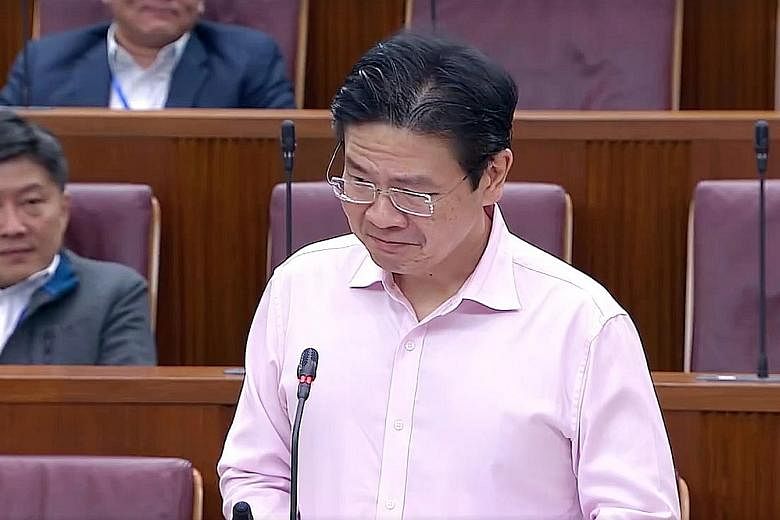The number of coronavirus cases will continue to rise in the coming weeks as some of the 200,000 overseas Singaporeans return home, Health Minister Gan Kim Yong told Parliament yesterday.
Singapore has to plan on the basis that Covid-19 will be around for a long while, and people have to make adjustments and do their part to contain the outbreak, he added.
He and his colleague, National Development Minister Lawrence Wong - who was overcome with emotion while acknowledging the contributions of staff on the front lines - outlined the strategy to counter the outbreak.
The number of patients has more than doubled in the past week, from 266 to 558 on Tuesday. Said Mr Gan, who co-chairs the multi-ministry task force tackling the outbreak: "Almost 80 per cent of these new cases were imported, all from countries other than China, even though we continued to see around 1,000 residents and long-term pass holders return from China in the past week."
The United Kingdom, the United States and Indonesia are the top three sources of imported cases.
Last night, the Ministry of Health announced a record 73 new cases, bringing the total to 631. Of the new cases, 38 were imported, and 27 linked to a cluster or previous cases.
As of yesterday, there have been more than 436,000 Covid-19 cases worldwide and over 19,600 deaths from the disease.
Mr Gan said Singapore has slowed the spread of Covid-19 by reducing importation, detecting and isolating cases early, and emphasising social responsibility and good personal hygiene habits.
All short-term visitors, including tourists, have been barred from entering or transiting since Tuesday, and Singaporeans have been advised to defer all travel until the global situation is under control. Border checks have also been strengthened to detect and isolate cases before they come into contact with the wider community.
Mr Gan noted that Singapore has also done around 39,000 tests for Covid-19 to date. This translates to 6,800 tests per million people here, compared with around 6,500 in South Korea and 1,000 in Taiwan.
These tests are key in detecting as many cases as possible and as early as possible, he said.
He noted that the World Health Organisation has said that the course of the pandemic can still be changed if all countries take the necessary containment actions.
"Otherwise, we will continue to see the number of affected countries and cases rise rapidly," he said.
Mr Wong, the multi-ministry task force co-chair, updated the House on border controls and other efforts to fight Covid-19.
Mr Wong noted that the number of cases globally was doubling every four to six days, and measures had to be rapidly updated to adjust.
Importantly, Singapore wants to focus its resources on the large numbers of citizens returning home amid lockdowns globally, he said.
About 1,200 Singaporeans return from the UK and US every day. There are now 38,000 people serving stay-home notices (SHNs), and their numbers will rise, he said.
Besides identifying those with symptoms at the airport, the Government is ramping up its capacity to test as many as possible.
But someone who tested negative at the point of entry may simply be incubating the virus, he said.
This is why it is key to isolate returnees, who must serve a 14-day SHN requiring them to remain in their residence, and avoid contact with others in the same household.
He noted that monitoring and enforcing these notices is a "huge operational and logistical undertaking", but the Government intends to continue with tough enforcement.
The rising number of locally transmitted cases, especially ones unlinked to earlier cases, also calls for a "whole range of additional public health measures to slow down the spread of the virus", said Mr Wong.
These include limiting gatherings outside of work and school to 10 people or fewer, suspending entertainment and religious gatherings, and imposing restrictions on malls and others for at least a month.
He noted these will be disruptive, saying it was a reality all countries face. "The more we try to stop or slow down the virus, the steeper the damage on our economies. We have to do what is necessary from the public health point of view first - to save lives, slow down the virus - and thereafter do our best to manage the economic consequences."
Deputy Prime Minister Heng Swee Keat will announce measures to help businesses and households in Parliament this afternoon.
Meanwhile, Mr Wong urged people to minimise non-essential activities and contact with others, saying Singapore is at a critical phase in the fight against the coronavirus.
Mr Wong teared up as he thanked the many front-line workers, from cleaners to those who cared for patients, calling them unsung heroes.
"We are only at the beginning of a very long fight," he said. "Let us rally together and rise to this challenge because as SG United, we can beat the virus together," he added.











